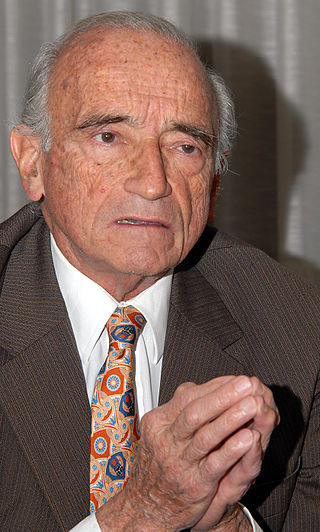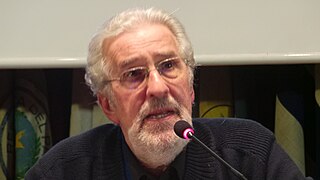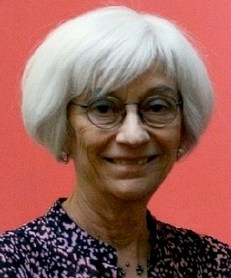Related Research Articles

Aldo Ferrer was an Argentine economist. He was one of the leading proponents of economic nationalism in Argentina.
José María Aricó was a prolific essayist, militant activist, and one of the driving forces in creating the New Intellectual Left within Argentina. Strongly influenced by Marx and Marxist thinkers like Antonio Gramsci, Kautsky, and others, Aricó would go on to promote these intellectuals through his own writings, translations and teachings.

Atilio Borón is an Argentine Marxist sociologist.

Rosalba C. Todaro was an economist and Senior Researcher at the Centro de Estudios de la Mujer in Santiago, Chile, and was the president of the International Association for Feminist Economics (IAFFE) from 2011 to 2012.
Alicia Girón González is the past president of the International Association for Feminist Economics (IAFFE), her tenure was 2014 to 2015. Girón has also served as director of Universidad Nacional Autónoma de México's (UNAM) Economic Research Institute (IIEc).

Gloria Bonder is an Argentine psychologist, researcher and gender activist. She founded the Center for Women's Studies (CEM) in 1979 and the Graduate Specialization and Women's Studies at the Psychology Faculty at the University of Buenos Aires. She is also principal of the Gender, Society and Policy Department, FLACSO. She became co-ordinator of the International Working Group on Women and ICT field of the United Nations and principal of the podium "Women, Science and Technology" in UNESCO. She is a member of the Advisory Board of Global Alliance for Information Technology and Communication and Development.
Feminism in Argentina is a set of movements aimed at defining, establishing, and defending equal political, economic, and social rights and equal opportunities for women in Argentina. Although some women have been considered precursors—among them Juana Manso and Juana Manuela Gorriti—feminism was introduced to the country as a result of the great European immigration wave that took place in the late 19th and early 20th century. The first feminists did not form a unified movement, but included anarchist and socialist activists, who incorporated women's issues into their revolutionary program, and prestigious freethinker women, who initially fought for access to higher education and, later, legal equality with men. The early 20th century was also full of women fighting for their freedom and rights in the workplace. Despite the efforts of the first-wave feminists, Argentine women did not acquire the right to vote until 1947, during Juan Perón's first government. His highly popular wife, Eva, championed women's suffrage and founded and ran the nation's first large-scale female political party, the Female Peronist Party. Although she refused to identify herself as a feminist, Eva Perón is valued for having redefined the role of women in politics.
Cecilia Braslavsky was an Argentine educator, pedagogue, and author. She served as Director-General of Educational Research in the Argentine Ministry of Education and Director of UNESCO's International Bureau of Education.

María Julieta Kirkwood Bañados was a Chilean sociologist, political scientist, university professor and feminist activist. She is considered one of the founders and impellers of the Chilean feminist movement in the 1980s. She is considered the forerunner of Gender studies in Chile.
Hilda María Herzer was an Argentine sociologist, environmentalist and professor. She was a researcher with FLACSO, and visiting professor at Universidad Nacional del Litoral.

Mónica Tarducci is an Argentine anthropologist and feminist activist. Her research focuses on the intersections of gender and religion, and on the adoption of children in the province of Misiones. Tarducci currently teaches at the Universidad de Buenos Aires and at the Universidad Nacional de San Martín.

Rita Laura Segato is an Argentine-Brazilian academic, who has been called "one of Latin America's most celebrated feminist anthropologists" and "one of the most lucid feminist thinkers of this era". She is specially known for her research oriented towards gender in indigenous villages and Latin American communities, violence against women and the relationships between gender, racism and colonialism. One of her specialist areas is the study of gender violence.

Rosa Cobo Bedía is a Spanish feminist, writer, and professor of sociology of gender at the University of A Coruña. She is also the director of the Center for Gender Studies and Feminists at the same university. Her main line of research is feminist theory and the sociology of gender.

María Cecilia Nahón is an Argentine economist, diplomat, and politician who served as Ambassador of Argentina to the United States from 2013 to 2015.

Silvia Gabriela Lospennato is an Argentine political scientist and politician, currently serving as National Deputy elected in Buenos Aires Province since 2015. She is a member of Republican Proposal (PRO).

Mirta Zaida Lobato is an Argentine historian, essayist, and full professor specializing in the social, cultural and political history of the world of work and gender relations in Argentina and Latin America in the 20th century. Lobato was the founder of "Área Interdisciplinaria de Estudios de la Mujer" (AIEM). She was awarded a Guggenheim Fellowship in 2006.

Suzana Prates was a Brazilian feminist sociologist and academic. She spent most of her professional career in Uruguay where she dedicated her life to national and Latin American feminist thought. She was the founder of the "Centro de Estudios e Informaciones del Uruguay" (CIESU) and, at the end of the 1970s, she founded the "Grupo de Estudios sobre la Condición de la Mujer en Uruguay" (GRECMU). Her colleagues included Julieta Kirkwood and Elizabeth Jelin.

The Faculty of Social Sciences, commonly and informally known as Sociales, is the social sciences faculty of the University of Buenos Aires (UBA), the largest university in Argentina. It was founded in 1988, and offers degrees on social work, sociology, labor relations, communication and political science, in addition to a number of post-graduate degrees.
Hilda Habichayn was an Argentine sociologist and feminist. She founded the Centro de Estudios Históricos sobre las Mujeres at the National University of Rosario in 1989 and an academic journal Zona Franca in 1992. The center, later renamed as Centro de Estudios Interdisciplinario sobre las Mujeres offered the first post-graduate degree in women's studies in Latin America from 1993. She served as director of the center and journal until her retirement in 2007.

Teresita de Barbieri García, was an Uruguayan feminist sociologist, academic, and researcher based in Mexico. A researcher in social sciences and gender studies, she was a pioneer in research on the condition of women in Latin America from the Institute of Social Research of the National Autonomous University of Mexico (UNAM). A socialist militant, she survived the 1973 Chilean coup d'état and went into exile in Mexico where she developed her research career. A sociologist at the Latin American Faculty of Social Sciences (FLACSO), she researched the daily life of women, the Latin American feminist movement, reproductive health, secularism and, in particular, population and development. She wrote articles for various newspapers and magazines, including Fem magazine and the "La Doble Jornada supplement" of La Jornada newspaper, as well as for Cimacnoticias (CIMAC).
References
- ↑ "Silvia Berger". iaffe.org. International Association for Feminist Economics (IAFFE) . Retrieved 30 August 2016.
- ↑ "Silvia Berger (books)". clacso.org.ar. Latin American Council of Social Sciences (CLACSO). Retrieved 30 August 2016.
- ↑ "Silvia Berger". iaffe.org. International Association for Feminist Economics (IAFFE) . Retrieved 30 August 2016.
- ↑ "Berger, Silvia". flacso.org.ar. Facultad Latinoamericana de Ciencias Sociales (FLACSO). Retrieved 30 August 2016.
- ↑ "Past presidents". International Association for Feminist Economics (IAFFE). Retrieved 2 August 2020.
- ↑ "Ola Financiera: editorial committee". olafinanciera.unam.mx. National Autonomous University of Mexico. ISSN 1870-1442 . Retrieved 30 August 2016.